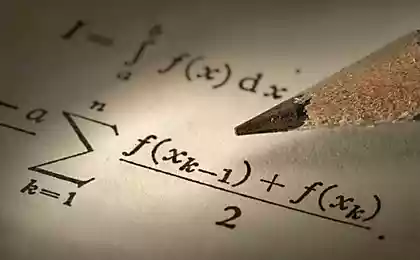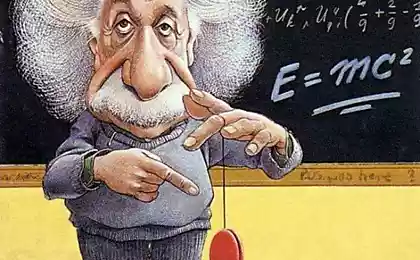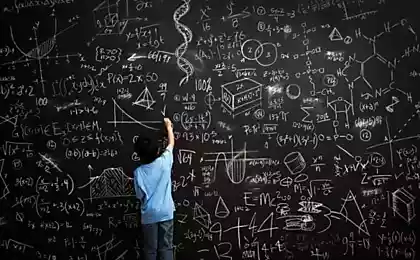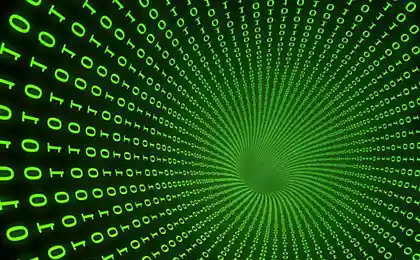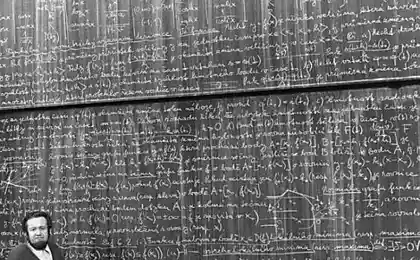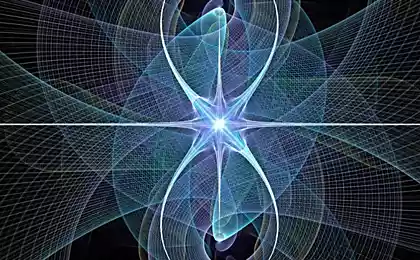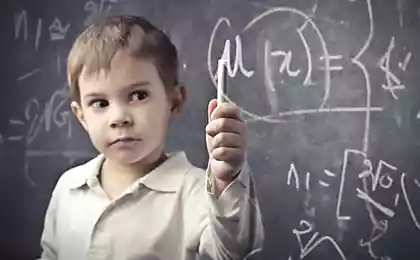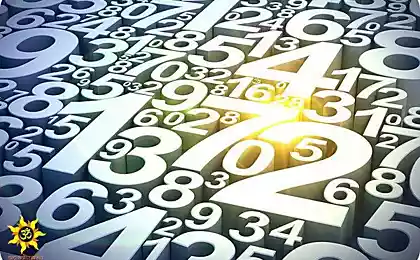963
Math from scratch: what is interesting is the number 0?
Zero is perhaps the first time in our life a mysterious number. We hear a lot, for example, about the wonders of PI, but few he had with him in everyday life. Not to mention the complex numbers. But with zero, we are confronted everywhere even on the keyboard indicating his figure completes the series.
But anyone understands that this number is not all right. In childhood, when we still thought that the arithmetic is only needed for the account, we were told that zero is the absence. And it was weird.
If I have zero candies, assume nothing at all — then why talk about them? Only poison the soul.Nineteen million six hundred ninety eight thousand four hundred ninety two
Therefore, in the history of mankind that number came later. Traders actively used the account, but to sell, for example, "zero sheep" didn't make sense. However, as a negative number.
Came curious: for example, the ancient Greeks did not use zero in principle, but already knew about irrational numbers such as √2. This was due to their love of geometry: if a right triangle the sides will be equal to 1, the length of the hypotenuse is calculated as √2.
But what about decimal system account? Even to record the "10" we need a zero. But here it only records the numbers: if you remember the Roman numerals, you will understand that ten can be represented as X. of Course, this form was not particularly comfortable, but even the Babylonians used a positional number system (i.e., close to ours, and not a Roman one), and was without a scratch. Some time it just was not the time to, say, 36 and 306 did not differ in spelling and was determined by the context. Then his role began to perform two wedge like these: 3’6. But then they are independent not matter — it was not the number "zero".
It is difficult to say when it actually appeared. While there is evidence that in India it was used before our era, after which it was adopted by the Arabs but in the West it began to come into practice only in the XIII century by the efforts of the Italian mathematician Leonard Fibonacci. And then, his love for Arab reckoning for a long time not taken seriously.
To "understand" zero, you have a lot of intellectual effort — such as that which actually led to the birth of numbers as abstractions. It is known that the first words denoting quantity, had a particular use with "five horses" and "five boats" was for the ancient people of different categories. To invent the zero, it was necessary to move to a new level of abstract thinking.
But if we believe in zero, its properties will amaze.
Raised to the zero power
With the most basic operations is not a problem to add a zero or subtract it from the number the number remains the same, to multiply by zero — you will get zero... it All fits into the framework of common sense.
It becomes more complicated when raised to a zero power. The school reported that the result in each case is one. Where did it come from?
Here his mind is already folded. The degree is, as you know, many times we take the number as a multiplier of itself.
22 = 2 ∙ 2 = 4
21 = 2
If the degree is zero, the number is not a multiplier at any time, but... as of this emptiness was "born" the unit?
Often at school this problem is solved dogmatically: the explanation is not is the desire and effort. But this is one of the borders, for which simple arithmetic, demonstrate on apples and other quantifiable things, it becomes pure and beautiful abstraction.
Remember the rules for dealing with numbers that are erected in degree, and let us imagine the following example:
xn/ xn In relations with the same degree of reason we can do the following:
xn/ xn= xn-n = x0 Simultaneously, we understand that the result of dividing any number by itself is a unit. So, miraculously, thanks to the adoption of zero as a number, we move on to the next strange discovery, and mathematics makes much more far leap from reality than the simple idea "I have zero sweets".
But it is the inner logic of the system that can be understood by the mind, but cannot be represented in the real world — this is the beauty of abstraction.
To divide by zero
"Division by zero as a sex — everything is possible, and students not" — joke can be considered witty, but it is only the truth. "Division by zero" has become an Internet meme, however, is quite uncertain. It means the annihilation of anything (and in fact it would be logical to multiply by zero), it is the destruction of the mathematical foundations of the universe. And the second is closer to the truth.
Most scientists still consider the surgery with zero is impossible or has an uncertain outcome.
Sixty six million sixty nine thousand eight hundred thirty six
Can do an experiment, having experienced handy calculators. For example, on the Android phone is the author of the material gave the answer «1 / 0 = ∞"and Windows 10, I get an error: "Division by zero is impossible." Most other calculators behaves the same. But in the first case it is possible to change the sign, and we get a strange picture: «-1 / 0 = -∞".
What's the matter, and why even machines cannot "agree"?
Purely arithmetically the divisibility by zero leads to risky conclusions. See for yourself:
0 ∙ x = 0 ∙ y, where x and y are any two arbitrary numbers. It's only known property is zero. But if it can be shared, reducing both parts, we get:
x = Any number equals any number, that destroys at once the foundations of arithmetic. Sunk.
Why is it sometimes comes on the infinity? The fact is that problem and try to solve using division by an infinitesimal function, that is, the graph of a function where x would approach zero. So we are trying to find y = 1 / x and get the following:
Thirty three million nine hundred sixty nine thousand one hundred six
And here it is, our result of dividing by zero, which goes in -∞ on the one hand and +∞ on the other.
What is not satisfied with this response, the majority of scientists? The fact that infinity can not be called an integer: usual arithmetic operations with it lead, again, to paradoxical conclusions.Though it and mathematical analysis, it is an idea, not a number.
We can say that 1 / 0 = ∞ — it's just an excuse, showing again the impossibility of the operation. By the way, dividing zero by zero there is an even greater unanimity: here if we meet to construct a function, the results can be almost anything (0, ±1, ±∞…)
In General, the zero being a number, again it undermines the foundations of mathematics, if we violate the integrity of its properties.
Zero is an even number?
If he's so unusual (and not forget that it is neither positive nor negative) whether it is possible to speak about its parity? Intuitively, we can guess that it is even, because the integers follow each other exactly on this principle: 2 — even, 1 — odd, the following must be even. But the alarming strangeness of zero, suggests that this issue need to keep your eyes open.
The paradox is that no special properties of zero in this matter. It is an even number. What is the main requirement it needs to go in this case? Division by two without a remainder, and he passes the test with dignity:0/2=0. Turns an integer of 0, and no matter how long we continue the division, the result will be same — you can say that it is "most" or even "infinitely" an even number.
To be more precise, we must take a different definition with the reverse operation. An even number can be represented in the form 2x where x is an integer, but in this case everything is just:0 = 2 ∙ 0.
There is a property of even numbers that when you add two of them should look again even, check:
0 + 2 = 2; 0 + 4 = 4 etc.
The unusual zero even his amazing match all seems strange, doesn't it?
What to watch and read about Nola?
To learn more about Nola as one of the most mysterious phenomena in mathematics and the history of its "discovery", you can refer to the following resources:
1. Numberphile. This is the most popular among the lovers of mathematics Youtube channel, which has more than 1.5 million subscribers. There is a video about Nola translated into Russian.
2. The Book Of Charles Safe "Is Zero. The biography of a dangerous idea". The author, though not without excessive exaggerating, tells the history of zero as a number and numbers — and in the broader context of the history of science, from Archimedes to string theory. As a bonus you will receive the app with puzzles, where you use the zero. For example, you will be asked to prove that Winston Churchill was a carrot and build a time machine out of mole holes.
3. A collection of essays in which the fiction writer Isaac Asimov talks about how people moving from account on your toes more and more sophisticated calculation, developed basic mathematical operations and how numbers relate to our perception of time and space. The nature of zero and his paradoxes is dedicated to opening the book, the article "Nothing Counts".
Also interesting: the Story of numbers: what numbers meant in ancient times
Fibonacci number
Even if you didn't like school neither arithmetic nor algebra, you always have the ability to be interested in them. To learn math from scratch will not work — somehow we began to believe more children. But to love her from scratch is a very real possibility.published
Author: Kirill Volkov
P. S. And remember, just changing your mind — together we change the world! ©
Source: newtonew.com/discussions/zero-in-math
But anyone understands that this number is not all right. In childhood, when we still thought that the arithmetic is only needed for the account, we were told that zero is the absence. And it was weird.
If I have zero candies, assume nothing at all — then why talk about them? Only poison the soul.Nineteen million six hundred ninety eight thousand four hundred ninety two
Therefore, in the history of mankind that number came later. Traders actively used the account, but to sell, for example, "zero sheep" didn't make sense. However, as a negative number.
Came curious: for example, the ancient Greeks did not use zero in principle, but already knew about irrational numbers such as √2. This was due to their love of geometry: if a right triangle the sides will be equal to 1, the length of the hypotenuse is calculated as √2.
But what about decimal system account? Even to record the "10" we need a zero. But here it only records the numbers: if you remember the Roman numerals, you will understand that ten can be represented as X. of Course, this form was not particularly comfortable, but even the Babylonians used a positional number system (i.e., close to ours, and not a Roman one), and was without a scratch. Some time it just was not the time to, say, 36 and 306 did not differ in spelling and was determined by the context. Then his role began to perform two wedge like these: 3’6. But then they are independent not matter — it was not the number "zero".
It is difficult to say when it actually appeared. While there is evidence that in India it was used before our era, after which it was adopted by the Arabs but in the West it began to come into practice only in the XIII century by the efforts of the Italian mathematician Leonard Fibonacci. And then, his love for Arab reckoning for a long time not taken seriously.
To "understand" zero, you have a lot of intellectual effort — such as that which actually led to the birth of numbers as abstractions. It is known that the first words denoting quantity, had a particular use with "five horses" and "five boats" was for the ancient people of different categories. To invent the zero, it was necessary to move to a new level of abstract thinking.
But if we believe in zero, its properties will amaze.
Raised to the zero power
With the most basic operations is not a problem to add a zero or subtract it from the number the number remains the same, to multiply by zero — you will get zero... it All fits into the framework of common sense.
It becomes more complicated when raised to a zero power. The school reported that the result in each case is one. Where did it come from?
Here his mind is already folded. The degree is, as you know, many times we take the number as a multiplier of itself.
22 = 2 ∙ 2 = 4
21 = 2
If the degree is zero, the number is not a multiplier at any time, but... as of this emptiness was "born" the unit?
Often at school this problem is solved dogmatically: the explanation is not is the desire and effort. But this is one of the borders, for which simple arithmetic, demonstrate on apples and other quantifiable things, it becomes pure and beautiful abstraction.
Remember the rules for dealing with numbers that are erected in degree, and let us imagine the following example:
xn/ xn In relations with the same degree of reason we can do the following:
xn/ xn= xn-n = x0 Simultaneously, we understand that the result of dividing any number by itself is a unit. So, miraculously, thanks to the adoption of zero as a number, we move on to the next strange discovery, and mathematics makes much more far leap from reality than the simple idea "I have zero sweets".
But it is the inner logic of the system that can be understood by the mind, but cannot be represented in the real world — this is the beauty of abstraction.
To divide by zero
"Division by zero as a sex — everything is possible, and students not" — joke can be considered witty, but it is only the truth. "Division by zero" has become an Internet meme, however, is quite uncertain. It means the annihilation of anything (and in fact it would be logical to multiply by zero), it is the destruction of the mathematical foundations of the universe. And the second is closer to the truth.
Most scientists still consider the surgery with zero is impossible or has an uncertain outcome.
Sixty six million sixty nine thousand eight hundred thirty six
Can do an experiment, having experienced handy calculators. For example, on the Android phone is the author of the material gave the answer «1 / 0 = ∞"and Windows 10, I get an error: "Division by zero is impossible." Most other calculators behaves the same. But in the first case it is possible to change the sign, and we get a strange picture: «-1 / 0 = -∞".
What's the matter, and why even machines cannot "agree"?
Purely arithmetically the divisibility by zero leads to risky conclusions. See for yourself:
0 ∙ x = 0 ∙ y, where x and y are any two arbitrary numbers. It's only known property is zero. But if it can be shared, reducing both parts, we get:
x = Any number equals any number, that destroys at once the foundations of arithmetic. Sunk.
Why is it sometimes comes on the infinity? The fact is that problem and try to solve using division by an infinitesimal function, that is, the graph of a function where x would approach zero. So we are trying to find y = 1 / x and get the following:
Thirty three million nine hundred sixty nine thousand one hundred six
And here it is, our result of dividing by zero, which goes in -∞ on the one hand and +∞ on the other.
What is not satisfied with this response, the majority of scientists? The fact that infinity can not be called an integer: usual arithmetic operations with it lead, again, to paradoxical conclusions.Though it and mathematical analysis, it is an idea, not a number.
We can say that 1 / 0 = ∞ — it's just an excuse, showing again the impossibility of the operation. By the way, dividing zero by zero there is an even greater unanimity: here if we meet to construct a function, the results can be almost anything (0, ±1, ±∞…)
In General, the zero being a number, again it undermines the foundations of mathematics, if we violate the integrity of its properties.
Zero is an even number?
If he's so unusual (and not forget that it is neither positive nor negative) whether it is possible to speak about its parity? Intuitively, we can guess that it is even, because the integers follow each other exactly on this principle: 2 — even, 1 — odd, the following must be even. But the alarming strangeness of zero, suggests that this issue need to keep your eyes open.
The paradox is that no special properties of zero in this matter. It is an even number. What is the main requirement it needs to go in this case? Division by two without a remainder, and he passes the test with dignity:0/2=0. Turns an integer of 0, and no matter how long we continue the division, the result will be same — you can say that it is "most" or even "infinitely" an even number.
To be more precise, we must take a different definition with the reverse operation. An even number can be represented in the form 2x where x is an integer, but in this case everything is just:0 = 2 ∙ 0.
There is a property of even numbers that when you add two of them should look again even, check:
0 + 2 = 2; 0 + 4 = 4 etc.
The unusual zero even his amazing match all seems strange, doesn't it?
What to watch and read about Nola?
To learn more about Nola as one of the most mysterious phenomena in mathematics and the history of its "discovery", you can refer to the following resources:
1. Numberphile. This is the most popular among the lovers of mathematics Youtube channel, which has more than 1.5 million subscribers. There is a video about Nola translated into Russian.
2. The Book Of Charles Safe "Is Zero. The biography of a dangerous idea". The author, though not without excessive exaggerating, tells the history of zero as a number and numbers — and in the broader context of the history of science, from Archimedes to string theory. As a bonus you will receive the app with puzzles, where you use the zero. For example, you will be asked to prove that Winston Churchill was a carrot and build a time machine out of mole holes.
3. A collection of essays in which the fiction writer Isaac Asimov talks about how people moving from account on your toes more and more sophisticated calculation, developed basic mathematical operations and how numbers relate to our perception of time and space. The nature of zero and his paradoxes is dedicated to opening the book, the article "Nothing Counts".
Also interesting: the Story of numbers: what numbers meant in ancient times
Fibonacci number
Even if you didn't like school neither arithmetic nor algebra, you always have the ability to be interested in them. To learn math from scratch will not work — somehow we began to believe more children. But to love her from scratch is a very real possibility.published
Author: Kirill Volkov
P. S. And remember, just changing your mind — together we change the world! ©
Source: newtonew.com/discussions/zero-in-math
Professor Ivan Neumyvakin: Soda is an essential product for health
Alice Miller: Moralization only takes children off the right track

